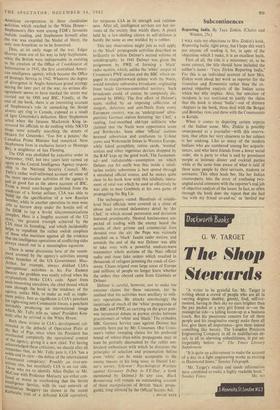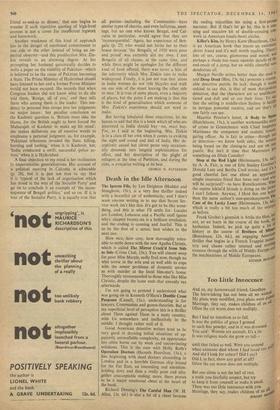Subcontinences
I WILL state my objections to Mrs. Zinkin's book, Reporting India, right away, but I hope this won't put anyone off reading it, for, in spite of the objections which I make, it is an excellent book.
First of all, the title is a misnomer; or, to be more correct, the title should have included the author's name: sTaya Zinkin Reporting India.' For this is an individual account of how Mrs. Zinkin went about her work as reporter for the Guardian and Economist rather than the ex- pected objective analysis of the Indian scene which her title implies. Also, her selection of incidents is too restricted to justify the claim that the book is about 'India'—out of thirteen chapters in the book, three deal with the Bengal and Bombay riots and three with the Communists in -Kerala.
When it comes to depicting certain aspects of the -Indian scene, Mrs. Zinkin is possibly unsurpassed as a journalist—with this reserva- tion, that often her very closeness to her subject is her undoing. Like so many of the modern Indians who are numbered among her acquain- tances, and who have friends from a lower social order, she is party to what is said by prominent people at intimate dinner and cocktail parties while at the same time aware of what is said of these same people by their servants, students or assistants. This often leads her, like her Indian counterparts, into the error of confusing two- angled social cOmment with the reporter's real job of objective analysis of the issues. In fact, so often through the book does she repeat that she had 'tea with my friend so-and-so,' or 'invited our friend so-and-so to dinner,' that one begins to wonder if such repetitive quoting of high-level sources is not a cover for insufficient legwork and homework.
Another weakness of this kind of approach lies in the danger of emotional commitment to one side or the other instead of being an im- partial observer—and this predilection Mrs. Zin- kin reveals to an alarming degree. At her prompting her husband quixotically decides to write a paper on the viability of Pakistan—which is believed to be the cause of Pakistan becoming a State. The Prime Minister of Hyderabad should have listened to her and a former Prime Minister would not have escaped. She records that when Congress leaders did not know what to do she fold them, 'Resign, all of you,' and then tells them who among them is the leader. This ten- dency to personal bias creeps into her judgments on major issues: her peculiar conclusion on the Kashmir question is, 'Britain must take the blame, for the British ought to have forced the Maharajah of Kashmir to make up his mind'; she makes deliberate use of emotive words to emphasise a personal judgment, as, for example, 'Pakistani tribesmen invaded the State, killing, burning and looting,' when it is Kashmir, but, 'India conducted a swift, successful police ac- tion,' when it is Hyderabad.
A final objection to my mind is her inclination to impermissible generalisations. Her account of a political meeting in Calcutta is admirable (p. 28), but it is just not true to say that it is 'typical of the lack of organisation which has stood in the way of the Socialist Party' and go on to conclude it an example of 'the incon- sequence of Bengali politics,' and so on. lilt is true of the Socialist Party, it is equally true that
all parties—including the Communists—have similar types of chaotic, and even ludicrous, meet- ings, but no one who knows Bengal, and Cal- cutta in particular, would agree that they are 'inconsequential.' Again, her experience of Ben- galis (p. 25) who would not invite her to their house because `the Bengalis of 1950 were poor and proud' was certainly not my own. I met Bengalis of all classes, at the same time, and while there might be apologies for the different kind of food offered, there was never a hint of the inferiority which Mrs. Zinkin tries to make widespread. Finally, it is just not true that 'alone in India women do not ride bicycles and walk on one side of the street leaving the other side to men.' It is true of some places, even a majority of places, but the point I am making is that this is the kind of generalisation which someone of Mrs. Zinkin's experience should not need to make.
But having tabulated these objections, let me hasten to add that this is a book which all who are interested in India should buy—no, must buy. For, as I said at the beginning, Mrs. Zinkin is in a class of her own when it comes to evoking the sight and sound and feel of India. Her de- ceptively casual but clever prose only occasion- ally descends into languid sophistication for effect, and her description of the plight of refugees at the time of Partition, and during the riots, is evocative writing at its best.
GEORGE N. PATTERSON



































 Previous page
Previous page